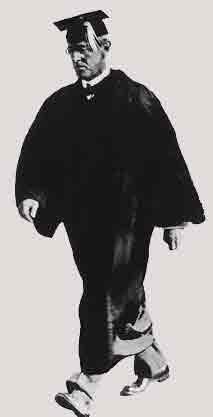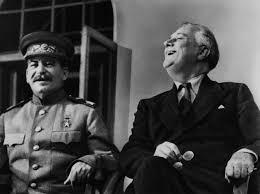
When Diana West finally mentions Herbert Hoover’s Freedom Betrayed in her recent expose of FDR’s Soviet-infused administration, American Betrayal, she seems much less impressed by the book than I was. “Hoover doesn’t explain the shift in thinking” (she writes) that left the Western world—from the Washington press corps to Winston Churchill—scrambling to obfuscate Soviet atrocities like the Katyn Forest massacre of 22,000 Polish officers. Hitler was the only evil on earth: Stalin’s satanic regime was forever being rehabilitated for public—and personal—consumption. The number of Ukrainians systematically starved under Stalin (and a lieutenant named Khrushchev) during the Twenties would roughly equal the tally of Jews later gassed by the Reich, and ample news of ongoing slaughter throughout Russia leaked out in the decade before the war. Nevertheless, Soviet communism was being patiently window-dressed long before Stalin’s assistance against Hitler was deemed necessary.
It is in this part of her deeply unsettling tome (about two-thirds through) that West raises the subject of “convergence” in detail: i.e., the theory that Western democracy and Eastern collectivism would harmoniously merge if our side bent to meet their side. In an arrogant naïveté of stupefying magnitude, Roosevelt seems to have answered William Bullitt’s warnings about the USSR as follows: “Bill, I don’t dispute your facts, they are accurate. I don’t dispute the logic of your reasoning. I just have a hunch that Stalin is not that kind of a man.” Bullitt summarizes FDR’s attitude as “the vice of wishful thinking,” a phrase embraced by West. And it’s a good phrase, but…
But I nonetheless have the feeling that Diana West herself comes short of providing a full motive for what James Burnham, many decades ago, called the “suicide of the West”. Infiltration of academe by communist operatives, check; penetration of the news media and the state department by Soviet moles, check; infection of the intelligentsia by the utopian theory of convergence, check; but… but what else? Nothing deeper? Manipulation by malevolent external forces, seduction by a beautiful design that looks good on paper… but why is the design seductive? Were those who so admired it smoking something that had been smuggled to them, once again, by malevolent external forces? How much of our folly can we blame on master-spies?
It’s still going on, after all. It’s happening every day. I don’t think the “vice of wishful thinking” was distilled into my erstwhile minister’s misty brain by a covert operative when she was blaring that the desire for borders is mere “xenophobia”. (Yes, I’ve changed churches.) There has to be some other reason why so many of us are so susceptible these days to childish delusions of such dangerous proportions. Doesn’t there?
My own theory is that something potentially fatal happens when a culture begins to lose touch with basic physical reality. Marxism views the Industrial Revolution as a watershed stage… and maybe the Marxists, like a broken clock, are right sometimes by accident. I, too, think the abrupt deracination of long-settled peoples from the land and their all-but-forcible (fully forcible, in Red China) transplantation to urban centers lies somewhere near the cause’s root. The sun no longer shines upon you throughout the day. You never again drink rainwater delivered by a clean brook. You don’t know the calls of various birds, or which call signals danger and which a change in the weather. You can’t identify a single constellation at night—hell, you can’t see a single constellation from most of these smoking urban crypts. The exiled millions no longer possess the kind of wisdom embodied in their parents’ proverbs. They don’t understand that “work is a great teacher” or that “the product of a man’s labor is his praise” (to cite a couple of Irish samples), as simple and earthy as such knowledge is. Instead, they learn that they must conserve their energy when performing servile chores for a paltry wage, and that only strength in massed numbers can resist the power of wealth and privilege.
The Industrial Revolution made human beings less human. It shifted our species from the apex of Nature’s pyramid and fixed it firmly within a termite mound, where a few queens were served by thousands of nameless minions. It crushed individuality while promoting conformity; it suppressed the free enterprise of the village’s clever artisans while spawning a ruthless kind of capitalism that largely predetermined the big winners.
That’s right, I said it (and, for some reason, it remains a highly provocative thing to say): capitalism, far from being a synonym for free enterprise, turns out to be its mortal enemy in the evolved, high-tech economy. Most of us haven’t come to grips with this; as a society, we certainly have not. We exhort our children to hurl themselves into mind-numbing, soul-killing careers after college (“Just be glad you found a job!”) and expect their generation to discern generous latitude for freedom and creativity in this arrangement. We ignore, most likely, the wreck in which our own careers left our higher ambitions. We seem to think that writing code to keep Amazon from being hacked is something like cutting and stitching good leather saddles or laying chimneys that will last a century.
And it’s not just a change in the spiritual quality of labor (the “despiritualization” of labor) that has fueled our corrupt taste for escapist fantasies—our “vice of wishful thinking”; the very feel of stone in the hand is alien to us, and the very scent of a horse in harness. We’ll laugh and exclaim, “Well, I’m glad I don’t have to smell that horse’s calling card out in the streets!” No, we don’t have to smell much of anything that’s unwelcome. If the woman at the desk next to ours wears too strident a perfume, we’re apt to complain to the boss. As for those flies that followed horses as mold follows deadwood… Pascal once mocked the philosopher whose airy speculations are ruinously disrupted by a little buzz at his head. Do we even comprehend his reference any more? Our air-conditioned spaces have banished noxious insects. We ourselves have grown as artificial as the indoor climate we have created.
Of course, here I write about the twenty-first century’s white-collar bureaucrat, not about a Joe in overalls carrying a lunch pail. But we have ever fewer of those Joes: their grandsons… they are us. The Industrial Revolution has produced so many machines to perform so many purely manual tasks that those who still have jobs tend to be punching keys rather than rivets. Our grandads were merely denied a view of the stars: we (and especially our children, if you’re my age) don’t understand the intricacies of the manually dialed “land line” phone. The stars? They’re those destinations where faintly green humans with pointed ears speak elegant English to Captain Kirk’s boarding party.
We’ve become practical idiots. Why learn to change a tire when you use Uber most of the time, anyway? What’s a washer? All that turning on and off of faucets… Siri or Alexa handles that. A torn shirt, a worn-out shoe? Search Amazon under “apparel”. (Or is it under “clothing”? The other word might be confused with “app”.) Hungry and don’t want to go out? Order pizza. Health-conscious? Google Home Chef or Magic Kitchen (or, better yet, download the app for future ease if you’re industrious).
I don’t say that we are idiots. Obviously, we’re technological whiz kids. But we are perfect imbeciles where the rubber meets the road (in a cliché I last heard during a Firestone commercial thirty years ago). We have no significant connection with hard labor—with sweat, bruises, dirty fingernails, gardens smoked by a heat wave, poured concrete ruined by a flash storm… we inhabit a bubble the reinforcement of whose artifice is usually the source of whatever good jobs remain. Ortega y Gasset wrote almost a century ago that modern man (and he says hombre masa, our ordinary Joe) lives in greater luxury than the Sun King did four hundred years ago. The emperor of all that he surveyed was still using a chamber pot less than two centuries ago: a kid raised in the Projects today scarcely catches a whiff of his effluent before he flushes it.
What has this to do with embracing Stalinism? Why, everything. It explains why we can embrace the “relief” of communism (no more unemployment, job interviews, performance evals, or constant competition) without sniffing its ordure (no more creativity, novelty, individuality, personal success, or free expression). We don’t understand how reality works—how it really works, off the drawing board and down in the shop (where assembly is now robotic). Our parents once learned something of human nature early on by reading great novels and plays in high school; now a phalanx of utopian evangelists from Education programs force-feeds us on the “narratives” (i.e., the monochrome, cartoonishly stereotyped struggles) of women fighting the patriarchy or Sioux orphans caught in the White Man’s world.
Once again, when I say “we”, I’m thinking especially of our children. We learned little enough about the great wide world, and now they have learned less than nothing (enough, for instance, to think that every tornado signifies climate change). I should really devote a second commentary to the pathological consequences of exile from hard reality that I see in their miserable ordeal (and I truly commiserate: they didn’t ask to be dealt this hand). I’m growing rather long for one morning.
Let me break off this half of my analysis, then, by stressing that we and our fathers—and, indeed, our grandfathers—were already suffering from the progressive disorder of “corrupted mind/world interface”. (Of course, the pun in “progressive” is intended.) Is it entirely accidental that Woodrow Wilson was an Ivory Tower eremite? It may indeed be accidental that he ended his kingly administration almost as a vegetable, with his wife running the bluff of competency for him; but then, just a couple of stops down the road, we have the wheelchair-ridden FDR, prince of all practical idiots. His anemic puppeteer, Harry Hopkins, was so debilitated by mysterious and chronic ill health that he arranged the rise of the Soviet Union mostly from his bed in the White House. I’ll leave the state of Barack Obama’s mind/body interface to your imagination. He apparently could lift a golf club and a basketball; but his “hands off our token half-African treasure” upbringing was certainly no initiation in the school of hard knocks, and his very fuzzy orientation to family and sexuality… no, I won’t go there.
Remember, though, that the real subject of this speculative study is the electorate that advanced such people. It’s us, and our children. It’s my (until recently) minister, older than I; and it’s the offense-detecting dynamos who dissolved into ungovernable indignation five years ago when I lightly quipped to a class of college seniors, “I hope the homework doesn’t drive her to suicide.”
No, we don’t behave—collectively—like normal, functional human beings of ages past. And there has to be some other reason than that Boris and Natasha have laced our drinking water with hemp.

